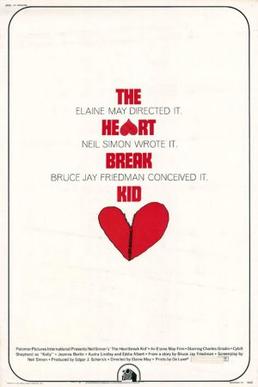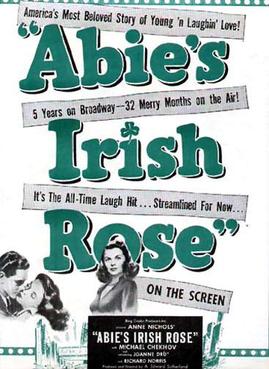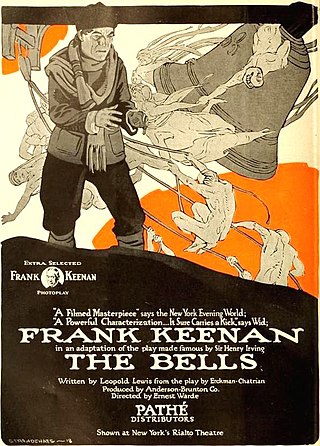
The Heartbreak Kid is a 1972 American romantic black comedy film directed by Elaine May and written by Neil Simon, starring Charles Grodin, Cybill Shepherd, Jeannie Berlin, Audra Lindley, Eddie Albert, and Doris Roberts. It is based on the short story "A Change of Plan", written by Bruce Jay Friedman and first published in Esquire in 1966.

Abie's Irish Rose is a popular comedy by Anne Nichols, which premiered in 1922. Initially a Broadway play, it has become familiar through repeated stage productions, films and radio programs. The basic premise involves an Irish Catholic girl and a young Jewish man who marry despite the objections of their families.

Nichols v. Universal Pictures Corporation, 45 F.2d 119, was a United States Court of Appeals for the Second Circuit case on copyright infringement by non-literal copying of a dramatic work. The Court held that copyright protection cannot be extended to the characteristics of stock characters in a story, whether it be a book, play, or film.

Anne Nichols was an American playwright best known as the author of Abie's Irish Rose.

Mary Loretta Philbin was an American film actress of the silent film era, who played Christine Daaé in the 1925 film The Phantom of the Opera opposite Lon Chaney, and Dea in The Man Who Laughs alongside Conrad Veidt.

Abie's Irish Rose is a 1928 early talking (Part-talkie) film directed by Victor Fleming and starring Charles "Buddy" Rogers, Nancy Carroll, Jean Hersholt, and J. Farrell MacDonald. It is based on the 1922 play Abie's Irish Rose by Anne Nichols. The film was later remade in 1946.

Salo Wittmayer Baron was an Austrian-born American historian, described as "the greatest Jewish historian of the 20th century". Baron taught at Columbia University from 1930 until his retirement in 1963.

Charles Albert Murray, was an American film actor of the silent era.

Why Girls Say No is a 1927 American silent comedy film featuring Max Davidson.
Anybody Here Seen Kelly? is a 1928 American silent comedy film directed by William Wyler. This was the first non-Western film to be directed by Wyler and is now considered to be a lost film. This is Bessie Love's final silent film. It was produced by Universal Pictures.

A Yankee Princess is a 1919 American silent comedy-drama film produced and distributed by the Vitagraph Company of America. It was directed by David Smith and stars Bessie Love, who also wrote the screenplay. It is a lost film.

In Hollywood with Potash and Perlmutter is a 1924 American silent comedy film, produced by Samuel Goldwyn, released through Associated First National Pictures, and directed by Alfred E. Green.

Hogan's Alley is a 1925 American silent comedy film produced and distributed by Warner Bros. It was an early directing assignment for Roy Del Ruth and starred Monte Blue, Patsy Ruth Miller, and Ben Turpin. This film is a precursor to the silent film One Round Hogan, a later Monte Blue boxing vehicle.

The Bells is a lost 1918 American silent drama film released by Pathé Exchange. It was adapted from the 1867 French play Le Juif Polonais by Erckmann-Chatrian and an 1871 English-language version, The Bells, by Leopold Lewis. The latter was a favorite vehicle for actor Henry Irving. This silent film stars Frank Keenan and Lois Wilson. The story was remade in 1926 as The Bells with Lionel Barrymore and Boris Karloff.

A Wise Fool is a 1921 American silent drama film produced by Famous Players–Lasky and released by Paramount Pictures. This film is based on the novel The Money Master by Sir Gilbert Parker and was directed by George Melford. James Kirkwood is the star of the film. A copy is held at the Library of Congress.

The Cohens and the Kellys in Paris is a 1928 American comedy film directed by William Beaudine. It was the first sequel to The Cohens and Kellys. The film title is sometimes listed as The Cohens and Kellys in Paris.

The Cohens and the Kellys in Scotland is a 1930 American comedy film. It is one of The Cohens and Kellys series, and is also the series' first sound film. It was directed by William James Craft and produced and released by Universal Pictures.

Abie's Irish Rose is a 1946 American comedy film directed by A. Edward Sutherland based on a play by Anne Nichols. The film stars Michael Chekhov, Joanne Dru, Richard Norris, J. M. Kerrigan, George E. Stone, Vera Gordon, and Emory Parnell. The film was released on December 27, 1946, by United Artists. It was a remake of the 1928 film that was based on the 1922 play Abie's Irish Rose by Anne Nichols. The film drew criticism for stereotyping and additional cuts were made after complaints.

Adrienne Dore was an American actress, model, and beauty pageant winner. She was first runner-up in the Miss America 1925 pageant, competing as Miss Los Angeles. Dore went on to have a modest career in motion pictures before retiring in 1934.

The Law Forbids is a 1924 American drama film directed by Jess Robbins and written by Lois Zellner and Ford Beebe. The film stars Baby Peggy, Robert Ellis, Elinor Fair, Winifred Bryson, James Corrigan, and Anna Dodge. The film was released on April 7, 1924, by Universal Pictures.





















